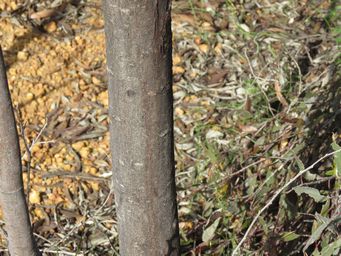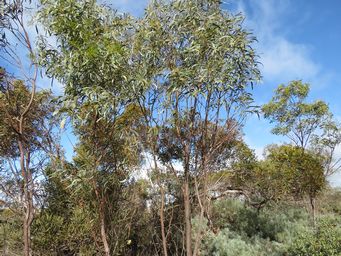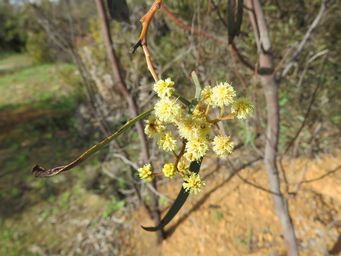Australia So Much to See
Copyright (C) 2013 AustraliaSoMuchtoSee.com. All reights reserved
Sources used for identification of wildflowers shown on these pages and regions where they occur see Credits
These pages will
feature some of the wildflowers we have photographed in Western Australia, and where possible, identified. If you
are able to help identify further flowers, or correct any I may have wrong, please contact us.
Information given for each species
will give botanical name, known common names, describe the flower, give time of year it flowered, and where it was photographed, and
the areas it occurs in. Names have been matched to Florabase which has also been used to show distribution.
See some
of these wildflower in larger sized photos on our Flickr pages.



Small Acacia shrubs above and below were flowering at Bridgetown in August.
Two unidentified small Acacia shrubs compared (at left) with the Acacia to the right of the photo having larger
and fluffier blooms with sickle shaped leaves.
Both have lines (ribs) on the stems which are similar, and is typical of Acacia nervosa.
Both have lines (ribs) on the stems which are similar, and is typical of Acacia nervosa.

Small Acacia shrub compared (at right) has fluffy golden blooms With smaller leaves that the the others on this page and
to Acacia nervosa, and was flowering in September after the other species had finished flowering. It still has the ribbing
on the stems of Acacia nervosa, but less obvious.

Acacia nervosa, Rib Wattle, Ribbed Wattle, Perfumed Wattle (above),
This small erect or sprawling shrub has round yellow
wattle flowers on a small shrub with slender leaves and thorns along the stems, as below. Pods forming in November above right
with the typical twisting shape of pods most noticeable at lower right of the upper photo. Ribbing effect can be seen
on the stem. Pod filling out with rounded seeds at right.
June to September
Bridgetown, South West region, Western Australia
and occurs through the South West, north of Perth and into the Wheatbelt and Great Southern as far as Albany

Other small Acacia species
We have photographed several different small acacia shrubs in the bushland around Bridgetown flowering
through the spring.
Despite differences in these plants as photographed and displayed at right and in the selection
below, they all meet the features of Acacia nervosa.











Acacia microbotrya, Manna Wattle, Menna, Badjong, Galyang, Galyung, Koonert, Kunart, Kwonnat, Men.
A shrub or tree which can grow
to seven or eight metres. Pale yellow clusters of flower balls. The smooth barked tree exudes a translucent sticky gum,
giving the name Manna Wattle (from the Aboriginal name of Menna for the gum from this and some other Acacia species).
August
This species has spread outside of its natural range due to spreading from being planted for roadside revegetation and use as a garden tree.
With around 1,200 species of Acacia in Australia, many of these are found in Western Australia, ranging from tall trees to low growing
shrubs. They are found in all climate regions. With some, mostly seen only when flowering so without seeing the pods or
seeds, positive identification cannot be made. Those named here are in these cases without a degree of certainty.